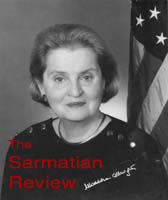| This Issue | Back Issues | Editorial Board | Contact Information |

Russia, Ukraine, and the Breakup of the Soviet Union
Reviewer: Bohdan Vitvitsky
Russia, Ukraine, and the Breakup of the Soviet Union
by Roman Szporluk. Stanford, CA: Hoover Institution Press. 2000. 437 pages. Paper. $24.95. Available from the Hoover Institution Press (800-935-2882) and Amazon.com.
This is a particularly illuminating set of essays that explore various connections and relationships that, at least in the literature available in English, are often either ignored, miscast or misunderstood. The principal focus of these essays, written between 1972-97, is the connections and relationships between Ukraine and Russia, Poland and Ukraine, Poland and Russia, and Czarist Russia and the USSR. But Professor Szporluk is also very much interested in the interrelationships between and among urbanization, modernization, empire, assimilation, and the politics of language and historical memory, all within the context of Eastern and Central Europe.
The sixteen essays include "Dilemmas of Russian Nationalism;" "The Soviet West--or Far Eastern Europe?"; "After Empire: What?"; "Ukraine: From an Imperial Periphery to a Sovereign State;" and "The Fall of the Tsarist Empire and the USSR: The Russian Question and Imperial Overextension."
In 2000, not a single Russian university offered Ukrainian Studies, whereas ten Polish universities have been offering these Studies for years.
It is rare to encounter a scholar writing in English about twentieth-century Eastern and Central Europe whose analysis is informed by such a thorough and broad-ranging familiarity with writings in Ukrainian, Polish, Russian, German and English. Part of this is perhaps due to serendipity. Roman Szporluk is an ethnic Ukrainian who was raised in Poland and educated at Lublin, Oxford and Stanford universities. For the last ten years, he has held the Hrushevsky Chair in Ukrainian History at Harvard. Szporluk's writings are also informed by some of his more theoretical interests that happen to have an unusually direct bearing on what has happened in Eastern and Central Europe. He is the author of, among others, Communism and Nationalism: Karl Marx versus Friedrich List (1988).
Sarmatian Review readers might find Szporluk's insights into certain continuities in the Polish-Russian 'encounter' of special interest. For example, he notes that "[a]fter 1945 the Poles challenged Soviet communism just as their nineteenth and early twentieth-century predecessors had historically done from the Kosciuszko Insurrection of 1794 to the workers' and students' strikes in Warsaw and Lodz in 1905." (412) And, "it was precisely because of the fact that the Polish [Solidarity] strikes were organized by workers and led by an electrician whose proletarian credentials were impeccable (and certainly more authentic than those of any of the leaders in Poland or in the USSR), that Poland could delegitimate the Soviet model on its own ground. This feat could not have been achieved by peasants or intellectuals or priests or students. The fact that the workers were both Polish and Catholic added a broader historical perspective to their struggle--making it another act in the centuries-long contest between a Catholic Poland and an Orthodox Russia." (412)
Lastly, it is striking how some things have changed, e.g., Poland's attitude towards its neighbors, while the Russians' insistence on remaining stubbornly delusional has not. Consider the following: Szporluk notes that in 1993-4, at least ten Polish universities and colleges offered Ukrainian studies, and most students enrolled in these programs were ethnic Poles rather than Ukrainians. In contrast, not a single Russian university offers Ukrainian studies. And, at a 1994 Russo- Ukrainian conference in Moscow, "during a difficult moment in the discussion a Russian delegate proposed that in 1995 Russians and Ukrainians celebrate together the two-hundredth anniversary of the third partition of Poland" (p.335).
Back to the April 2001 issue
The Sarmatian Review
sarmatia@rice.edu
Last updated 04/19/01